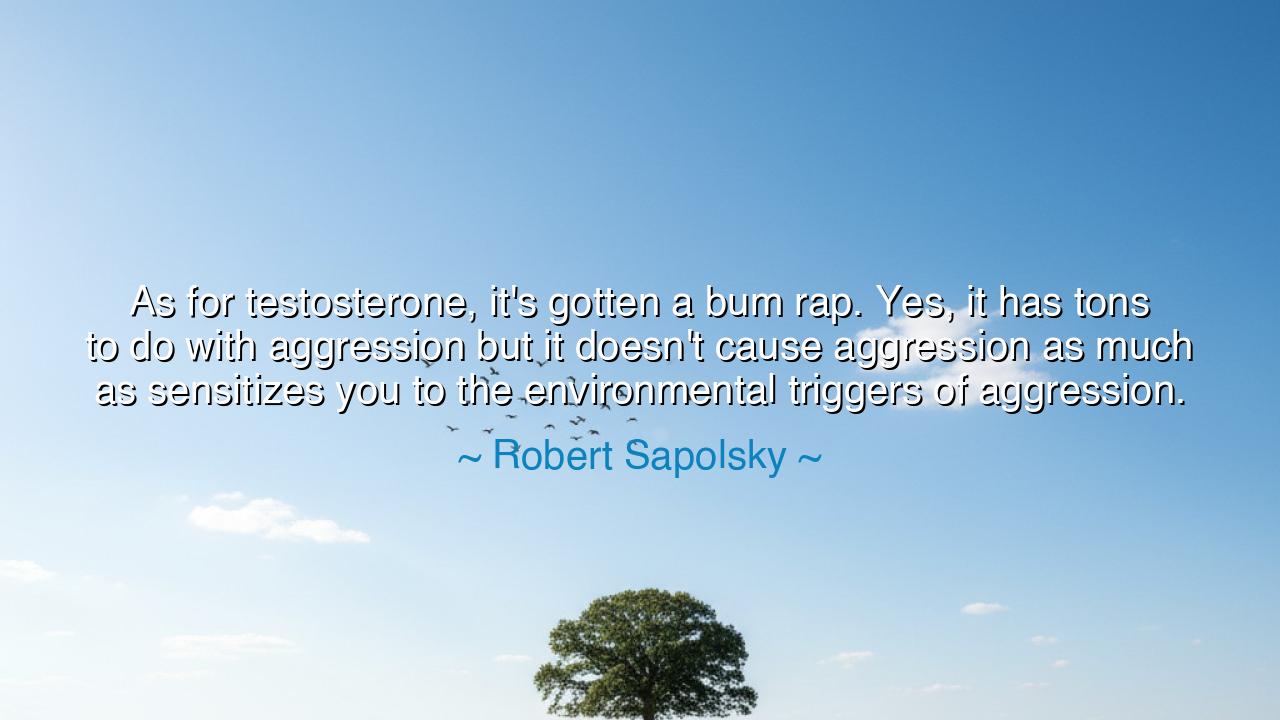
As for testosterone, it's gotten a bum rap. Yes, it has tons to
As for testosterone, it's gotten a bum rap. Yes, it has tons to do with aggression but it doesn't cause aggression as much as sensitizes you to the environmental triggers of aggression.






When Robert Sapolsky said, “As for testosterone, it’s gotten a bum rap. Yes, it has tons to do with aggression but it doesn’t cause aggression as much as sensitizes you to the environmental triggers of aggression,” he spoke as both a scientist and philosopher of human nature. His words are not the cold observation of biology, but a warm illumination of truth — that the roots of violence and competition lie not in destiny, but in context. In his reflection, Sapolsky reveals that testosterone, long blamed as the source of human cruelty and dominance, is not an evil force within us, but a mirror — amplifying the world around us, reflecting what our culture, our circumstances, and our choices demand of us.
The origin of this wisdom comes from Sapolsky’s decades of work as a neuroendocrinologist and primatologist, studying baboons and humans alike to understand the subtle interplay between biology and behavior. He discovered that testosterone does not simply make one violent; it heightens sensitivity to status, competition, and threat. A peaceful environment makes it nurture leadership, confidence, and protection. A hostile one makes it fuel conflict and domination. Thus, aggression is not the creation of hormones, but the reaction of the spirit to its surroundings. Sapolsky’s insight reminds us that nature gives us power, but environment and wisdom determine how that power is used.
The ancients, too, would have understood this truth, though in different language. The Stoics of Greece spoke of passions — forces that arise naturally in all men and women — which must be guided by virtue lest they consume the soul. The fire that cooks one’s meal can also burn one’s home. The same is true of testosterone, of ambition, of strength itself. None are evil in essence; they become destructive only when divorced from self-awareness. The ancient warrior knew this balance well — to wield the sword without becoming the sword, to fight without hatred. Sapolsky’s science and the wisdom of the ancients meet upon the same ground: mastery of the self begins with understanding, not denial, of one’s nature.
History bears witness to what happens when this balance is lost. Consider the tale of Sparta, a society that worshiped strength above all else. Its people lived and died for battle, and their boys were raised from birth to suppress emotion and exalt conquest. For a time, they were feared and invincible. But when peace came, they found no purpose; their aggression had no soil for growth, only for decay. Sparta fell not to an enemy, but to the emptiness of its own creation. The unchecked glorification of dominance consumed its heart. Sapolsky’s words echo across centuries: when aggression is nurtured by the wrong environment, it destroys both the world and the self.
Yet, there is a gentler lesson hidden within his insight. Just as environment can awaken aggression, it can also awaken compassion and courage. In peaceful settings, testosterone does not vanish — it transforms. It fuels confidence, perseverance, and leadership. The same chemical that drives warriors to defend their land can drive teachers to defend their students, or parents to protect their families. Sapolsky teaches us that our biology is not a prison; it is a tool shaped by context. The greater question, then, is not “what makes us violent,” but “what kind of world do we build that calls violence forth?”
In this light, his words become a call to responsibility. We must not demonize our nature, but guide it — just as a sculptor guides raw stone into form. To raise a generation free from senseless aggression, we must cultivate cultures of respect, where strength is used not to dominate but to defend, not to conquer but to uplift. Schools, homes, and communities must teach not suppression, but awareness — for only the aware can choose peace over pride.
The lesson, then, is this: hormones may awaken instinct, but it is wisdom that gives them purpose. The fire within us need not be extinguished; it must be directed. As Sapolsky reveals, aggression is not an inevitability — it is a response, shaped by the world we build and the choices we make within it.
So, my children, remember: the beast and the sage dwell in the same heart. One reacts, the other reflects. Feed not the environment that calls forth the beast. Surround yourself with harmony, seek understanding before judgment, and teach others to see that biology is not destiny. For those who master their nature do not suppress it — they transform it into strength guided by compassion. In this transformation lies the highest victory of humankind: to wield power without cruelty, and to rule oneself before ruling the world.






AAdministratorAdministrator
Welcome, honored guests. Please leave a comment, we will respond soon